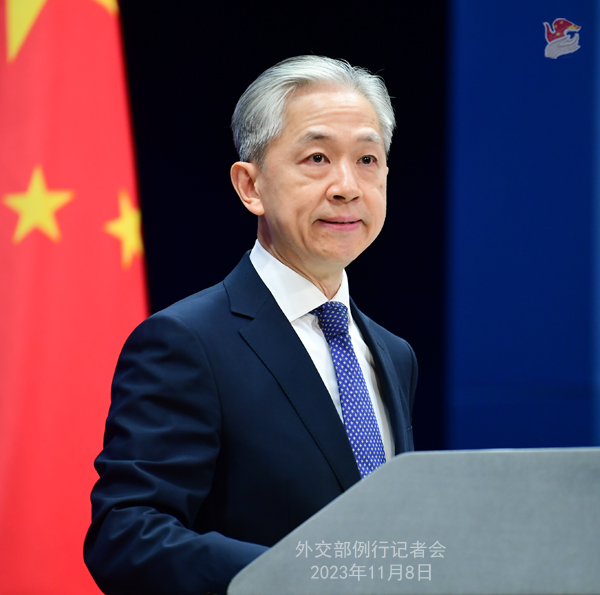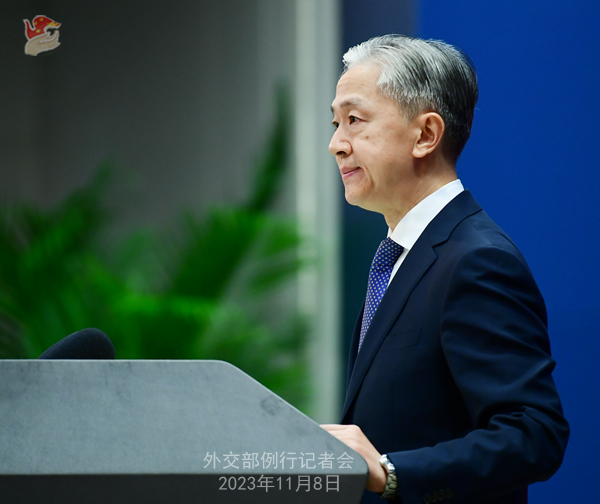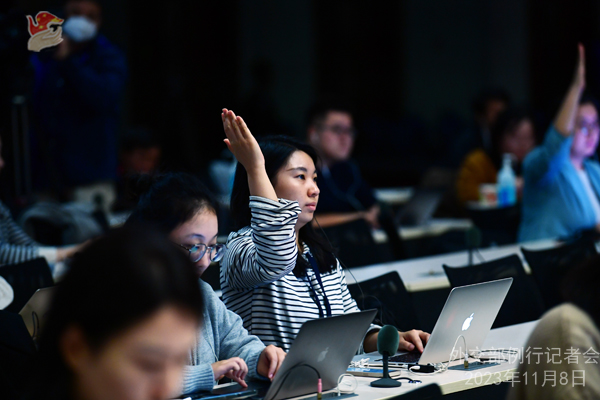| Foreign Ministry Spokesperson Wang Wenbin’s Regular Press Conference on November 8, 2023 |
| 2023-11-08 20:25 |
|
China Review News: Australian Prime Minister Anthony Albanese has concluded his visit to China. After meeting with Chinese leaders, he told reporters that “I walk away from the meeting satisfied that we have positive engagement between Australia and China” and thanked the Chinese side for its warm hospitality. How does China see the visit? What are your expectations for bilateral ties going forward? Wang Wenbin: This is the first visit by an Australian Prime Minister to China in seven years and Prime Minister Albanese’s first visit to China since he took office. The visit pays tribute to the historic visit by former Australian Prime Minister Gough Whitlam to China 50 years ago, and marks yet another important high-level exchange between the two countries since President Xi Jinping met with Prime Minister Albanese in Bali last November and the meeting between Chinese Premier and the Australian Prime Minister in Jakarta in September. It is an important opportunity for the two sides to build on what has been achieved and chart the way forward. During the visit, President Xi Jinping and Prime Minister Albanese held in-depth strategic communication on issues of strategic and overarching importance that bear on the direction and long-term growth of China-Australia relations, which provides strategic guidance for sustained improvement and advancement of bilateral ties. Premier Li Qiang held talks with Prime Minister Albanese. They had comprehensive and in-depth exchange of views on China-Australia relations and international and regional issues of mutual interest, and reached important common understandings. NPC Chairman Zhao Leji also had in-depth friendly exchanges with Prime Minister Albanese on bilateral relations and exchanges between the legislative bodies of the two countries. The exchanges between the leaders were wide-ranging, deep-going, productive and carried out in a friendly atmosphere. The visit was positively received in both countries and internationally. China is ready to work with Australia to be guided by the important common understandings reached by the leaders, stay committed to the principle of mutual respect, equality, mutual benefit and seeking common ground while shelving differences, actively implement the outcomes of the visit, further strengthen dialogue and cooperation, deepen political mutual trust, enhance friendship between our peoples, and promote the continued improvement and growth of the China-Australia comprehensive strategic partnership from this new starting point to deliver more benefits to both countries and peoples and contribute more positive energy to regional and global peace and stability. TASS: Kyodo News quoted a US official as saying that US President Joe Biden and Chinese President Xi Jinping plan to hold bilateral talks on the sidelines of the Asia Pacific Economic Cooperation (APEC) Leaders’ Meeting in San Francisco. Can the Foreign Ministry confirm this? Wang Wenbin: The two sides have agreed to work together for the meeting between the two Presidents in San Francisco. In the meantime, it won’t be plain sailing to San Francisco, nor can we leave it to autopilot to get us there. The two sides need to return to what was agreed between the two Presidents in Bali and truly act on it. What is vital is for both sides to rise above disruptions, overcome obstacles, expand common understandings and accumulate potential outcomes. Global Times: It’s reported that French President Emmanuel Macron announced he will hold a “humanitarian conference” on Gaza on November 9. Will China send delegates to the conference? Wang Wenbin: Special Envoy of the Chinese Government on the Middle East Issue Zhai Jun will attend the international conference on humanitarian aid for Gaza’s civilians in France on November 9. China will continue to work relentlessly with the international community to bring about an early ceasefire, protect civilians, provide humanitarian assistance and implement the two-state solution. AFP: It was said that the National Committee on US-China Relations and the US-China Business Council will be hosting a dinner on November 15 in San Francisco. Does the foreign ministry have any details on which official will be attending? Wang Wenbin: I do not have information to offer on that.
Bloomberg: The Chinese Ambassador to Estonia told a member of the Estonian parliament that the ambassador may leave the country if Taiwan opens a representative office there. Can you confirm those comments that were told to the media by the Estonian parliamentarian? Do you have anything more to add to that? Wang Wenbin: There is only one China in the world. The government of the People’s Republic of China is the sole legal government representing the whole of China. Taiwan is an inalienable part of China’s territory. We firmly oppose any form of official interaction between the Taiwan region and countries having diplomatic ties with China and oppose any action supporting “Taiwan independence” separatist forces. We call on Estonia to stay committed to its solemn commitment of adhering to the one-China principle, not to allow Taiwan to set up any organization of official nature, and earnestly safeguard the political foundation of its relations with China. NHK: The recent “International Uyghur Forum” in Tokyo urged the Japanese government to conduct an independent investigation into the human rights situation in Xinjiang. What’s the foreign ministry’s response to this? Wang Wenbin: Xinjiang today enjoys social stability, economic prosperity, ethnic solidarity and religious harmony. The people in Xinjiang live a peaceful and happy life. Since the beginning of this year, more than 100 foreign delegations, including two groups of Japanese tourists, have visited Xinjiang. They experienced in person the unique charm of Xinjiang and spoke highly of its economic and social progress. They also recognized the strong efforts of the Chinese government to protect the multi-ethnic culture and freedom of religious belief in Xinjiang. The so-called “World Uyghur Congress” is an anti-China separatist organization. It has a long track record of spreading rumors and lies about Xinjiang and inciting violence, terrorism and separatism. The so-called “International Uyghur Forum” you mentioned is nothing but theatrics staged by the “World Uyghur Congress”. Xinjiang-related issues are China’s internal affairs. No country has the right to interfere. We firmly reject attacks and smears against China by anyone or any force using human rights as a pretext and groundless accusations about the human rights conditions in Xinjiang. Such attempts will not get anywhere. Beijing Daily: We noted that the World Intellectual Property Organization (WIPO) this week released the World Intellectual Property Indicators Report, saying that China is the country with the highest number of patent filings in 2022. What’s your comment? Wang Wenbin: We noted the report that you mentioned. The report shows that innovators from China filed about 1.6 million patent applications in 2022, which topped the world. Data shows that by the end of June, the total number of valid invention patents in China exceeded 4.568 million, outnumbering other countries in the world. China ranks the 12th in the Global Innovation Index 2023 and tops the world on six indicators. These numbers speak volumes about China’s accomplishment in the field of intellectual property (IP). This years marks the 50th anniversary of China’s cooperation with the World Intellectual Property Organization (WIPO). In the past five decades, China has attached high importance to IP protection, improved the legal system and worked actively to foster a world-class, market-oriented business environment governed by a sound legal framework. China is deeply involved in global intellectual property governance and firmly upholds the multilateral system regarding IP. China entered a number of agreements, including the Madrid Agreement Concerning the International Registration of Marks, the Patent Cooperation Treaty, the Hague Agreement Concerning the International Registration of Industrial Designs and the Marrakesh Treaty on protecting copyright. We signed the China-EU agreement on cooperation on and protection of geographical indications with 244 geographical indications being mutually recognized and protected. Courts in Shanghai, Fujian and Hainan have launched cooperation with the WIPO Arbitration and Mediation Center to facilitate the resolution of foreign IP disputes. China’s work on IP protection has been widely recognized at home and abroad. In 2022, public approval rating for IP protection in China reached 81.25 out of 100, up by 17.56 points from ten years ago. According to the European Business in China Business Confidence Survey 2022 released by the European Union Chamber of Commerce in China, more than half of respondents reported enforcement of IP laws and regulations as excellent or adequate. More and more foreign applicants are looking to plan their patent portfolios in China. Over the past decade or so, applicants from 115 Belt and Road partner countries filed applications for a total of 253,000 patents in China, an annual increase of 5.4 percent. China will continue to enhance the quality and efficiency of its work on IP, improve the environment for IP protection, and unleash people’s creativity across all sectors. We stand ready to strengthen exchanges and cooperation with all countries and take an active part in global IP governance to form vast synergy together for social progress. Hubei Media Group: The first Belt and Road Conference on Science and Technology Exchange was concluded yesterday. Can you brief us on the event? What’s China’s view on the significance of scientific and technological cooperation in high-quality Belt and Road cooperation? Wang Wenbin: “Advancing scientific and technological innovation” is one of the eight major steps that President Xi Jinping announced to support our joint pursuit of high-quality Belt and Road cooperation. The first Belt and Road Conference on Science and Technology Exchange was successfully held in Chongqing this week. President Xi Jinping sent a congratulatory message to the conference. Member of the Standing Committee of the Political Bureau of the CPC Central Committee and Vice Premier of the State Council Ding Xuexiang attended the opening ceremony and delivered remarks. The conference was attended by representatives from over 80 countries and international organizations and achieved fruitful outcomes. It is another major step by China in implementing the outcomes of the third Belt and Road Forum for International Cooperation. Over the past decade since the Belt and Road Initiative was proposed, China has worked with all parties in advancing sci-tech and innovation cooperation and achieved tangible outcomes. China has signed inter-governmental sci-tech cooperation deals with over 80 partner countries, supported over 10,000 young scientists from partner countries to have short-term working experience and exchanges in China and trained 16,000 sci-tech and management personnel from partner countries. China and partner countries carried out a number of joint research projects, established over 50 Belt and Road joint laboratories in areas of agriculture, medical care, information, new energy and basic research and set up 10 overseas science and education centers. We have also established nine cross-border technology transfer platforms targeting ASEAN, Arab states, Africa and other regions, forming an extensive technology transfer network to serve the industrial upgrading in those countries. The first Belt and Road Conference on Science and Technology Exchange issued the International Science and Technology Cooperation Initiative, which champions open, fair, equitable and non-discriminatory international science and technology cooperation, and the development of science for the benefit of all regardless of borders. China stands ready to build on this conference and work with partner countries to jointly build partnerships, foster driving forces and create an open environment for innovation and improve global science and technology governance. We will work together to develop the Silk Road of innovation at a faster pace and jointly build a global science and technology community. Bloomberg: If Argentinian presidential candidate Javier Milei wins the election, how do you think this will affect China’s relationship with Argentina? Does China have a preferred candidate in the coming election? Wang Wenbin: The general election is Argentina’s internal affair and I won’t comment on that. China and Argentina are comprehensive strategic partners. China stands ready to work with Argentina to strive for new achievements in bilateral relations and bring more benefits to the two peoples.
China Daily: We noted that yesterday the IMF in its latest report scaled up projected growth rate of the Chinese economy to 5.4 percent and 4.6 percent for 2023 and 2024 respectively, up by 0.4 percentage point compared with October projections. The IMF’s First Deputy Managing Director Gita Gopinath said: “The Chinese economy is on track to meet the government’s 2023 growth target, reflecting a strong post-COVID recovery.” What’s China’s comment? Wang Wenbin: We noted what you mentioned. Recently, financial institutions, including J.P. Morgan, UBS, and Deutsche Bank, scaled up their projections of this year’s Chinese economic growth and believed that Chinese macroeconomic policies are delivering results and the third quarter has seen a sustained economic rebound with increasing internal driving forces, higher quality of development and accumulating factors conducive to economic development. Since the year began, despite the complex and severe external environment, such as the sluggish global economic recovery and high global inflation rate, the Chinese economy has shown strong resilience, potential and dynamism. We have been upgrading the industrial structure, shifting from old drivers of growth to new ones, and opening up new areas and new arenas in development. IMF Senior Resident Representative in China said that China remains the single largest contributor to global growth and accounts for one-third of it. According to the latest survey by the China Council for the Promotion of International Trade, nearly 70 percent of the surveyed foreign-funded enterprises expressed their confidence in the prospect of the Chinese market for the next five years. Foreign businesses have been enthusiastic in taking part in the China International Import Expo, China International Fair for Trade in Services, the Canton Fair and the China International Consumer Products Expo, which speaks to their readiness to keep exploring the Chinese market. China will remain an anchor and source of strength for world economic growth. We will continue to advance high-level opening up, promote high-quality development, share new opportunities with the world brought by Chinese modernization and make even greater contribution to global economic recovery, development and prosperity. CCTV: It has been a month since the outbreak of the Palestinian-Israeli conflict. Despite repeated international call for ceasefire, the conflict continues and civilian casualties have kept rising. What is your comment? Will China come up with more measures to help deescalate the situation? Wang Wenbin: One month may be a short period of time for most people, but the past month has been excruciatingly long for the Palestinians. Over 10,000 Palestinians, including many women and children, have lost their lives. As we speak, civilian casualties continue rising by the hour. We are deeply saddened by the civilian deaths on both sides in the conflict. It is heart-wrenching to see the humanitarian catastrophe worsening in Gaza. Neither Israelis nor Palestinians should become targets of armed attack or collective punishment. Violence does not bring true security. The use of force will not create lasting peace. To get detained civilians released, protect the safety and security of civilians and civilian facilities, open up humanitarian aid corridors and resume dialogue and negotiation is both the responsibility of the parties concerned and the goal that the international community must strive for. Since the outbreak of the conflict, China has been firmly committed to easing tensions and bringing about a ceasefire. President Xi Jinping has pointed out that the two-state solution is the fundamental way out of the recurring Palestinian-Israeli conflict. Member of the Political Bureau of the CPC Central Committee and Foreign Minister Wang Yi has had in-depth communication with foreign ministers, heads and political figures of 18 countries and international organizations. The Special Envoy of the Chinese Government on the Middle East Issue visited five Middle East countries and attended the Cairo Peace Summit on the Palestinian question to consult extensively with relevant parties on this issue. He is scheduled to attend the international conference on humanitarian aid for Gaza’s civilians to be held in France on November 9. China supports solidarity among Arab countries and the Islamic world, and greater mediation efforts for a ceasefire and resumption of peace talks. China calls for prompt and responsible Security Council action to protect civilians and ease the humanitarian situation in Gaza. China calls for an international peace conference with greater authority as soon as possible to build up new consensus on getting the two-state solution back on track. As a permanent member of the UN Security Council and a responsible member of the international community, China will continue to maintain close communication with relevant parties and do our utmost to protect civilians, ease the situation, resume peace talks and realize peace. ************************************* Today marks the Journalists’ Day in China. I would like to wish all the friends from the press, Chinese and foreign alike, a very happy Journalists’ Day.
|
 | ||||||||||||
 | ||||||||||||
|



